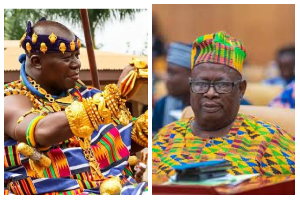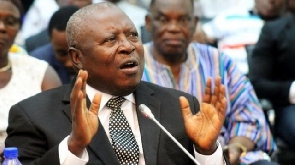The Bank of Ghana will from July 2007 introduce new cedi notes and coins to replace the existing ones. The Governor of the Bank of Ghana, Dr. Paul Acquah, explaining the re-denomination has said the current notes, which are in denominations of 20,000, 10,000, 5,000, 2,000 and 1,000 and the coins in 500, 200 and 100 would be re-denominated "by setting a 10,000 cedis to one new Ghana Cedi". This means that 500,000 cedis would be equivalent to 50GH Cedis, 200,000 cedis would be equivalent to 20GH cedis, 100,000 cedis would be equivalent to and 10GH cedis, 5,000 cedis would be equivalent to 50Gp, 2,000 cedis would be equivalent to 20Gp, and 1,000 cedis would be equivalent to 10Gp.
The bread and butter explanation of this exercise is that the metro-bus fare in Accra, now 1,000 cedis flat will after re-denomination be 10Gp flat while the average long distance transport fare such as Accra-Takoradi now 60,000 cedis would become GHC6.00 while a bottle of beer now 8,000 cedis would be 80Gp and coca cola now at 2,500 cedis would sell at 25Gp.
In terms of the timing of this exercise, this is the best opportunity for Ghana as historically re-denominations have been very successful in a moment of macroeconomic stability. The PNDC tried a mini re-denomination of the C50 in 1982 and it was a disaster because Ghana did not at the time enjoy macroeconomic stability. Currently Ghana is enjoying a sanctimonious environment of macroeconomic stability. This is evidenced by declining inflation, stable exchange rate, fiscal prudence, and well-anchored pricing of goods and services based on the market forces of demand and supply.
This is all fine and beautiful and we have been told by the Bank of Ghana that the benefits will be immeasurable. Currently the size of our currency defies all book keeping regulations. Money counting machines cannot conceptualize the size of the zeros and it makes budgeting and accounting very difficult, as transaction volumes are too high. Currently the transaction volumes are such that compatibility with data processing and accountancy software becomes a problem thus financial record keeping and payroll systems become manual, tediously long and prone to ghost names corruption. The conversion of C5, 000 and below into coins would also increase the efficiency of banknote processing systems and improve the overall quality of banknotes in circulation.
For me personally however, the portability of the new cedi is the biggest advantage to be derived from this exercise. The current bulky amounts that people have to carry to transact day to day business make them susceptible to attacks by burglars and crooks. These days anyone carrying a black polythene bag becomes a target for criminals. This exercise will hopefully put this problem of carrying bulky sums of money on us to rest.
The biggest problem though for this re-denomination exercise is the ability of people to conceptualize it quickly enough to return Ghana to business. This means people must be given adequate time to understand how the new currency works. There should be no element of compulsion to accept the change over within a tight time frame. So far we have been given the start date and it is my fervent hope that there is not going to be a cut off point. By this I mean that from whatever date in July 2007 until the all the old notes finally find their way into the banks through natural business transactions, the new and the old denominations should be accepted. So I can choose to buy my beer with the old C8000 or the new 80Gp. I should not be told to go into a queue in front of any bank on a certain day to change my money into the new denomination, otherwise the old notes will be rendered useless. We have seen this in the past- the SMC and the PNDC took us through these ordeals in 1978 and 1982 respectively and if these regimes have their respect among Ghanaians for other things they may have done for Ghana, I cannot forgive them for the inconvenience both exercises put me through. In all civilized economies such as we are trying to build in Ghana, old and new denominations are legal tenders until the central bank is able to capture all the old notes and put enough new notes in circulation. In the case of Ghana this will be quite a long time as the culture of banking has not fully permeated the system and people still prefer to keep their money home.
It has been argued that one of the solutions to early conceptualization would have been to wipe off three zeros. This making C20,000 equivalent to C20, C10,000 equivalent to C10, C5,000 equivalent to C5, C2,000 equivalent toC2 and C1,000 equivalent to C1. Currently four zeros are being slashed off and this makes understanding the new denominations quite difficult. Quite frankly 20,000 down to 20 is much easier to conceptualize than 20,000 down to 2. The strong argument against this argument though is that the size would become too big too soon as there is still a lot of money in people’s pockets. Again this would not help will the need to circulate and use coins for everyday activities such as using them in vendor machines and car packing metre machines when introduced. The Ghanaian economy is indexed against the dollar and if we are to push the re-set button for the Ghanaian economy to rise beyond the current plateau, then there is a case for making the cedi equivalent to the dollar. We must reach for the stars; at least if we don’t reach them, we can land on the moon.
The next solution which is akin to good education exercise will be dual pricing. There is nothing that registers quicker that visual impression. There must be a legal requirement for all shops to display prices of good in both the new and the old cedi equivalent. Thus a stall of beer must display price like this: 80Gp/C8, 000. This means the supermarkets like A-Life and the Mobil-Marts must clearly display their prices in both denominations. This dual pricing must continue for at least six months, if not more, to ensure that people are able to visualize the comparison between the new and the old.
This biggest battle though is not in the supermarkets but in the open markets of Makola, Mallata, Kaa Djaano, Kumasi Dwem, Kejetia, Asafo-Market, Kotokoraba, Abofour and Techiman Dwem where 80% of business takes place. Here the so-called forces of demand and supply do not necessarily determine price. What determines prices is the bargaining power of the individuals. Prices are fixed at random, often by the dictates of the season or even the day. The price of a tuber of yam is different between Sunday and Monday at Techiman, simply because one of the days is a “market day” and one is not. This is the market for the survival of the fittest. Prices do not reflect the value of the item being sold but the ability to peck the price at a level where the seller will make the most profit, especially with food items. There is no pricing policy and therefore prices are fixed purely by strength of bargaining. When the VAT was introduced by NDC, market women who genuinely did not understand the concept suddenly increased the prices of their wares. This was due to both lack of education and the exploitation of the situation to make excess profit. What is to convince me now that if I am to give up my C20, 000 for NC2, I will be able to buy the same amount of items as I would have bought with the old C20, 000?
The riskiest element in this whole exercise is that we cannot have trial days. Once it starts, it starts and there is no room for error. We have not been told the extent of mass education that the Bank of Ghana is going to embark on. Ghanaians as a people, both home and abroad, have very little respect for small values of money. We are used to “big money” and to change our psyche into accepting NC100 instead of C1m will require a great deal of education. No where in the world do they respect small denominations as in UK, yet Ghanaians in UK do not respect £10 donations given to them at funerals or parties. Our mentality is all geared towards large sums of money. A million plus a point seems to be our fascination. The Bank of Ghana has a tall order to educate us that, it is all right to give up your millions for hundreds and you will still be OK.
Let me also take this opportunity to digress a wee bit to advise the BoG that if they have been bold enough to cease the day with this re-denomination exercise, they should also be bold enough to break the trinity cartel of Barclays, Ecobank and Standard Chartered Banks in setting interest rates for borrowing in Ghana. These three foreign banks have been leading the BoG by the nose by dictating the direction of interest rates thus making it extremely difficult for small scale businesses to borrow to expand their businesses. If we are to re-set the economy and gear it up from its current plateau, then the attack must be on all prongs. Private Banks have no business in almost setting the APR without the central bank having any control over them.
Back to redenomination and in conclusion I would like to state that pricing of goods and services after July 2007 will hold the key to the value of the new cedi. Economic analysis and market research should be combined to provide a true picture of consumer behaviour towards new prices of good to reflect this re-domination exercise. To ensure that customers (both buyers and sellers) retain their business loyalty as well as feeling of good will towards the new denomination in their pockets, price changes into the new denominations need to be marketed effectively. There should be established immediately a national information campaign on the redenomination to avoid the pitfalls of the Zimbabwean redenomination where prices did not respond and hence people found it cheaper to use 5000 notes in toilets instead of using 10,000 to buy toilet rolls. A stitch in time, they say, saves nine.
God bless Ghana.















